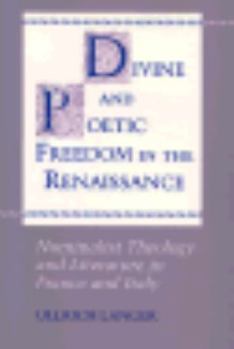Divine and Poetic Freedom in the Renaissance: Nominalist Theology and Literature in France and Italy
Select Format
Select Condition 
Book Overview
The closely related problems of creativity and freedom have long been seen as emblematic of the Renaissance. Ullrich Langer, however, argues that French and Italian Renaissance literature can be profitably reconceived in terms of the way these problems are treated in late medieval scholasticism in general and nominalist theology in particular. Looking at a subject that is relatively unexplored by literary critics, Langer introduces the reader to some basic features of nominalist theology and uses these to focus on what we find to be "modern" in French and Italian literature of the fifteenth and sixteenth centuries. Langer demonstrates that this literature, often in its most interesting moments, represents freedom from constraint in the figures of the poet and the reader and in the fictional world itself. In Langer's view, nominalist theology provides a set of concepts that helps us understand the intellectual context of that freedom: God, the secular sovereign, and the poet are similarly absolved of external necessity in their relationships to their worlds. Originally published in 1990. The Princeton Legacy Library uses the latest print-on-demand technology to again make available previously out-of-print books from the distinguished backlist of Princeton University Press. These editions preserve the original texts of these important books while presenting them in durable paperback and hardcover editions. The goal of the Princeton Legacy Library is to vastly increase access to the rich scholarly heritage found in the thousands of books published by Princeton University Press since its founding in 1905.
Format:Hardcover
Language:English
ISBN:0691068534
ISBN13:9780691068534
Release Date:October 1990
Publisher:Princeton University Press
Length:223 Pages
Weight:1.20 lbs.
Dimensions:0.9" x 6.5" x 9.6"
Customer Reviews
0 rating





